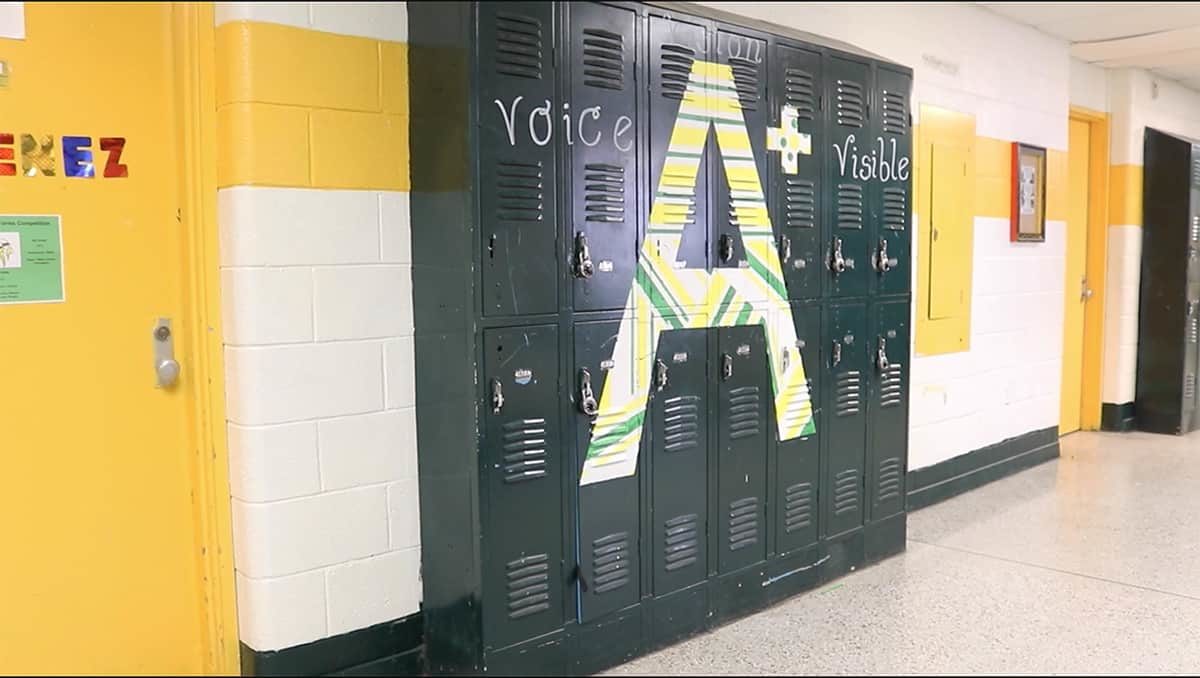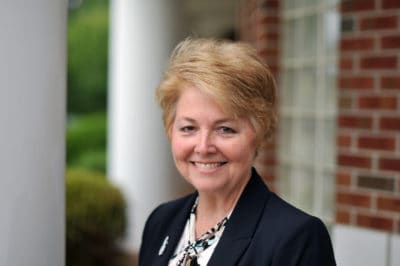
Rochelle Middle School is located about 1.3 miles from the nationally acclaimed restaurant Chef and the Farmer in Kinston. It feels much farther away, and isolated from the revitalization you feel walking the streets of Kinston.
The school has 100 percent free and reduced-price meal participation and a minority enrollment of 96 percent. It is also considered a low-performing school by the state of North Carolina having received a grade of F in the latest report card.
Walking the halls as some students switched classes, speaking with first-year teachers, and receiving a broad overview of the school as part of a site visit with the North Carolina New Teacher Support Program, it was hard to reconcile the school’s F letter grade from the North Carolina state report cards with the energy in the school building.
Classroom instructional time was no exception.
Jawed Wahabzada teaches eighth-grade math, and he never stopped moving, encouraging, and lifting up his students last Friday. Felita Gilliam, an instructional coach with the New Teacher Support Program, provided backup to both Wahabzada and the students. Gilliam, and other instructional coaches, are constantly evaluating the classroom and looking for opportunities for improvement.
Rebecca Zarrow was teaching seventh-grade English. Her students were very engaged as she spoke with them about an article that they had just read as a class about lions and their behavior. And they seemed excited as she broke out iPad’s for them to use for online quizzes. April Shackleford, another instructional coach for the program, frantically scribbled down notes as Zarrow taught, and as she left the classroom she quietly slipped the notes on to Zarrow’s desk.
The North Carolina New Teacher Support Program grew out of the Race to the Top initiative as a method to support teachers in their first three years in the profession. The program has largely focused on high priority schools – those schools which are defined by the data collected by the state as among the lowest performing in North Carolina. Those schools typically have higher rates of teacher turnover and the New Teacher Support Program hopes to combat attrition.
The new teachers assembled in the media center at Rochelle Middle School spoke to the personal responsibility that they feel for each of their students. They spoke to the challenges they face, recounting tearful drives home, but also to the moments of celebration when their students had a breakthrough.
Assistant Principal Andre Whitfield described many of the students who walk the halls of Rochelle Middle as “stand in parents” for younger siblings, recounting how some of the students practically raise themselves. Instability at home, absent parents can all lead to what is defined as adverse childhood experiences.
Adverse childhood experiences (ACEs) are defined as, “potentially traumatic events that can have negative, lasting effects on health and well-being. These experiences range from physical, emotional, or sexual abuse to parental divorce or the incarceration of a parent or guardian.”
David Thompson, director of student services for Buncombe County Schools, is a statewide leader on the issue of compassionate schools and trauma sensitive learning. Three days before our visit to Rochelle Middle, Thompson had shared his lessons from Buncombe County attempting to develop a trauma sensitive strategy with the Public School Forum.
One key finding was that “stressed brains don’t learn in the same way that non-stressed brains do.”
Thompson told us that stressed brains can generate a number of negative actions and reactions including physical aggression, isolating behavior, confusion, truancy, breaking rules, and poor grades.
Thompson also walked us through the concepts behind the Adverse Childhood Experiences pyramid, which include a number of negative biological outcomes including slowed language development, attention problems, speech delay, poor verbal memory, and loss of brain matter.
According to Thompson’s presentation, students with three or more adverse childhood experiences are two-and-a-half times more likely to fail a grade, score lower on standardized tests, have poor health, miss more days of school, and be suspended or expelled more.
The new teachers at Rochelle Middle, and other schools serviced by the North Carolina New Teacher Support Program, teach upwards of 100 students daily who may well bring a range of adverse experiences into the classroom with them each day. The premise of the New Teacher Support Program is that if beginning teachers feel supported they will stay in the classroom and shape their communities. Compassion begins with empathy, which often flows from experience. If we are to adopt compassionate models of learning that work for every child, it will require keeping teachers in the classroom year after year.
Recommended reading



